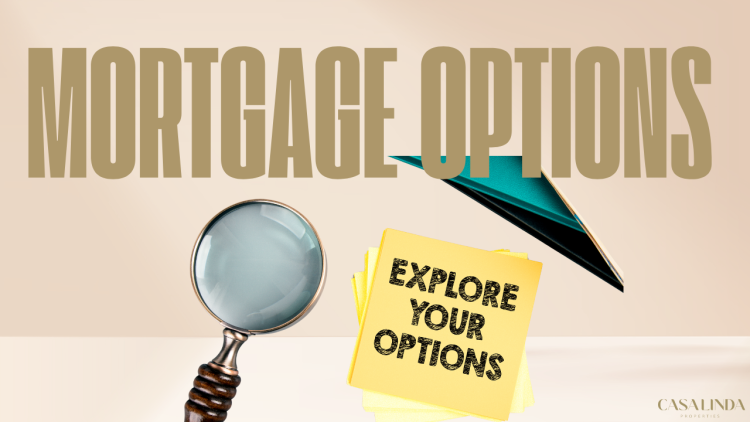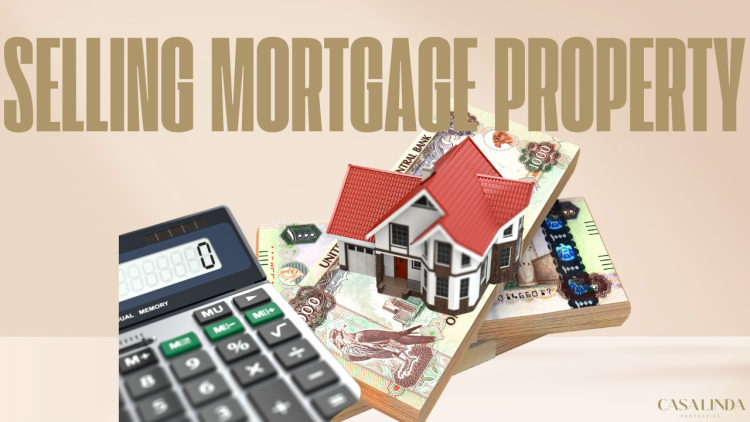Navigating Mortgage Options in Dubai: What Type of Loan Is Right for You?
Content:

Navigating Mortgage Options in Dubai: What Type of Loan Is Right for You?
Buying property in Dubai can be an exciting yet overwhelming experience, especially when choosing the right mortgage. With various options available, from fixed-rate to variable-rate loans, understanding what best suits your financial situation is essential for long-term success.
In this guide, we’ll break down each mortgage type, discuss its advantages and disadvantages, and provide valuable insights to empower your decision-making process. Here at Casalinda Properties, our team of specialists is dedicated to helping you navigate the complexities of mortgage options, ensuring you find the perfect fit for your property investment goals. Let’s get started on your journey to securing your dream home!

1. Fixed-Rate Mortgage
A fixed-rate mortgage is one of the most straightforward options available to buyers. With this type of loan, the interest rate remains constant throughout the loan’s duration, regardless of market fluctuations. This gives borrowers a clear understanding of their monthly payments, which can be especially appealing for long-term financial planning.
Pros: The biggest advantage of a fixed-rate mortgage is its predictability. Homebuyers know exactly how much they need to pay every month, making it easier to budget for other expenses.
Additionally, fixed-rate mortgages can be particularly beneficial if you "lock in" a low interest rate when market rates are favorable. "Locking in" means securing that interest rate for the entire loan term, protecting you from future rate increases.
Cons: The downside is that fixed-rate mortgages tend to have higher starting interest rates compared to variable-rate options. This is because the lender is taking on the risk that market rates might rise in the future. If market rates drop after you've secured your fixed rate, you won’t benefit from the lower rates unless you refinance your mortgage.
Key Advice: A fixed-rate mortgage is an excellent choice for those who value financial stability and plan to hold onto their property for the long term. If you're risk-averse and prefer knowing what your payments will be in the years ahead, this option provides peace of mind.
2. Variable-Rate Mortgage
In contrast to fixed-rate mortgages, a variable-rate mortgage has an interest rate that fluctuates based on market conditions. This can either result in lower or higher monthly payments, depending on the state of the economy.
2.1. Discounted Rate Mortgage
A discounted rate mortgage offers a discount on the lender's Standard Variable Rate (SVR) for an agreed period. Once this initial period ends, the interest rate typically reverts to the SVR.
Pros: The initial discount can make monthly payments more affordable, especially for first-time buyers or those on a tight budget. This can also help buyers qualify for larger loans during the discount period.
Cons: After the discounted period ends, borrowers are subject to potentially higher interest rates, depending on the market’s direction.
Key Advice: If you're confident that interest rates will remain low or that your financial situation will improve in the near term, this option could be beneficial. However, plan for the potential increase in payments once the discount period ends.
2.2 Capped Mortgage
A capped mortgage places a ceiling on how high your interest rate can go. While the interest rate can fluctuate, it will never exceed the capped limit set by the lender.
Pros: The benefit of a capped mortgage is that it combines the flexibility of a variable-rate loan with the security of knowing your interest rate won’t exceed a certain level.
Cons: The initial rates on capped mortgages may be higher than other variable-rate loans because of the protection offered by the cap.
Key Advice: This option is suitable for buyers who want to take advantage of lower rates but also want protection against sharp rate increases. It’s particularly useful during times of economic uncertainty.
3. Remortgage
A remortgage involves switching your existing mortgage to a new deal or lender, typically to secure a better interest rate or to borrow more against your property. This is common when initial mortgage deals end, and borrowers look for better options to reduce their monthly payments or access additional funds.
Pros: Remortgaging can save borrowers money by locking in better interest rates, and it can also help release equity from your home for renovations, investments, or debt consolidation.
Cons: Switching lenders can sometimes come with fees, such as early repayment charges on your existing mortgage. The process of remortgaging can also be time-consuming, involving paperwork and property valuations.
Key Advice: Remortgaging is most beneficial for homeowners looking to reduce their monthly mortgage costs or access extra funds. Make sure to consider any penalties or fees associated with your current mortgage before making a switch.
4. Offset Mortgage
An offset mortgage links your mortgage to a savings or current account. Instead of earning interest on your savings, the balance in your savings account is offset against your mortgage, reducing the amount of interest charged on the mortgage.
Pros: An offset mortgage allows you to reduce your mortgage interest charges by offsetting your savings against the loan balance. You also retain access to your savings, providing flexibility for future expenses.
Cons: Offset mortgages typically come with higher interest rates compared to standard mortgages because of the added benefit of reducing interest with your savings. If you don’t have substantial savings, the cost of the higher interest rate may outweigh the benefits.
Key Advice: If you have significant savings and prefer flexibility, an offset mortgage can help you save on interest. This option is ideal for financially disciplined borrowers who can maintain a healthy savings balance.
5. Investment Mortgage
An investment mortgage is designed for buyers looking to purchase property as an investment rather than a primary residence. This type of mortgage is commonly used for rental properties or properties expected to appreciate.
Pros: Investment mortgages allow property investors to leverage financing while earning rental income or capital appreciation. These mortgages often have flexible terms for experienced investors.
Cons: Interest rates on investment mortgages are usually higher than those for residential mortgages, and lenders may require a larger down payment due to the increased risk.
Key Advice: Ideal for experienced property investors, this mortgage type requires a solid understanding of the market. If you plan to generate income through rent or resale, be prepared for the higher costs associated with investment properties.
6. Non-Residential Mortgage
Non-residential mortgages are designed for properties not intended for personal use, such as commercial real estate or industrial properties. These mortgages have specific terms suited to businesses or investors purchasing commercial spaces.
Pros: These mortgages open opportunities for buyers to invest in commercial properties, which can generate rental income or be used for their businesses.
Cons: Non-residential mortgages often have stricter lending criteria and higher interest rates than residential mortgages.
Key Advice: Suitable for business owners or investors expanding their commercial property portfolios, these loans are ideal if you’re seeking to grow your business through property investment.
Mortgage Providers and Required Documents
When considering a mortgage in Dubai, potential investors should be aware of various banks and financial institutions that offer tailored mortgage products. Some of the prominent banks include Emirates NBD, Dubai Islamic Bank, Abu Dhabi Commercial Bank (ADCB), and Mashreq Bank. These banks provide a range of options suitable for both residential and investment properties.
To secure a mortgage, investors typically need to prepare several key documents, including a valid passport, residency visa, proof of income (such as salary slips or bank statements), and details of any existing financial commitments.
Additionally, banks may require property-related documents, including a sale agreement and a valuation report. It's advisable to consult with a mortgage advisor or the bank directly to ensure that you have all the necessary documentation to facilitate a smooth application process.
Mortgage by Property Type
- Residential Mortgage
Designed for individuals purchasing a home for personal use, residential mortgages tend to have the most favorable interest rates and terms.
- Commercial Mortgage
Used for purchasing commercial properties like offices, retail shops, or warehouses, commercial mortgages typically have higher interest rates and stricter terms than residential ones.
- Land and Construction Mortgage
This type of mortgage is ideal for buyers looking to purchase land or finance the construction of a property. It offers flexibility in financing land purchases and development projects.
Making the Right Choice: Finding the Best Mortgage for Your Needs

When buying property in Dubai, selecting the right mortgage is essential to ensuring long-term financial stability. From fixed-rate and variable-rate mortgages to remortgaging and offset mortgages, each option has its advantages and challenges.
Whether you're purchasing a home or investing in commercial real estate, understanding the pros and cons of each mortgage type will help you make an informed decision. Consulting a mortgage advisor such as Casalinda Properties can also provide personalized guidance tailored to your financial goals.
Questionnaire
- Which mortgage type is best for buyers seeking predictability?
A fixed-rate mortgage provides the stability of knowing your monthly payments won’t change over time, making it ideal for long-term financial planning.
- What’s the main advantage of a discounted-rate mortgage?
A discounted rate mortgage offers lower initial monthly payments, especially appealing for first-time buyers or those needing short-term financial relief.
- What safeguard does a capped mortgage offer?
A capped mortgage ensures that your interest rate will never exceed a certain level, providing peace of mind during periods of rising interest rates.
- Can you remortgage if your current mortgage deal isn’t favorable anymore?
Yes, remortgaging allows you to switch to a new deal with better rates or terms, helping you save on interest or access additional funds.
- Is an offset mortgage suitable if you don’t have large savings?
No, an offset mortgage works best for those with substantial savings, as it allows you to reduce the amount of interest paid on the mortgage.



